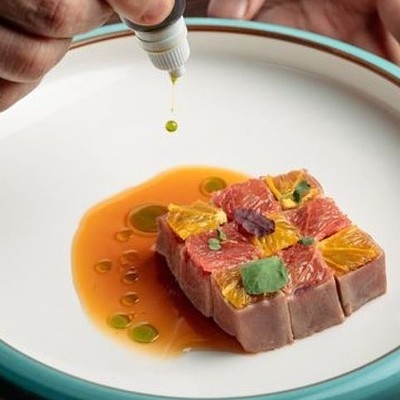The first time I tasted Thalassitis by the Gaia winery (Santorini, Greece), it was poured for me by the "best sommelier in the world 2008," Aldo Sohm, at Le Bernardin in New York City in 2010.
Aldo paired the wine with raw sea urchin: The "saltiness" and intense acidity of this wine, he noted, was ideal with the rich flavor and "seawater" undertone of the meaty urchin. The match was sublimely brilliant.
From that day onward, I have sought out and drunk the wines of Santorini wherever and whenever I can find them. And I was thrilled when I found the Gaia Thalassitis, made from the Assyrtiko grape, at Spec's for under $25. It's my go-to wine for sushi, and it's fantastic with Gulf Coast seafood, whether raw, fried, or étouffée (crawfish pistolette and Assyrtiko, anyone? Hell yeah!).
The name Thalassitis (THAH-lah-SEE-teess) means of/from the sea and the designation is right on: The wine literally tastes like the Aegean sea in a glass.
The winemaking conditions on the island of Santorini could not be more forbidding for contemporary winemaking. Temperatures during summer months are extreme and the constant and often violent wind (typical of the archipelago) makes it nearly impossible to cultivate fine wine grapes using modern vine training techniques. The solution? Basket training, an ancient method for grape cultivation whereby the vines are "trained" to low-lying baskets about one meter in diameter. The canopy naturally formed by the basket protects the fruit from the summer sun and the year-round winds.
The harsh climate of Santorini makes it difficult to grow grapes there, and it's surprising how affordable these wines remain, considering the quality. The yields are extremely low but the mineral-driven fruit delivered by the island's volcanic subsoils has made Santorini one of the most sought-after appellations among young sommeliers in the U.S. today.
Although they are hard to find in Houston, Santorini by the Boutari and Sigalas wineries are also available in Texas.
You'll find that the lip-smacking acidity in these wines will keep them fresh in the fridge for a couple of days after you've opened them. My advice? Take a bottle home, drink a glass for dinner, and then revisit the next evening: You'll find that the wine will reveal even more flavor the next day (be careful, however, not to serve it too cold, because excessive chill will mask its flavor).
And if you happen to get a seat at the bar at Le Bernandin in New York (which only seats four persons), tell Aldo I sent you...
Follow Eating Our Words on Facebook and on Twitter @EatingOurWords






